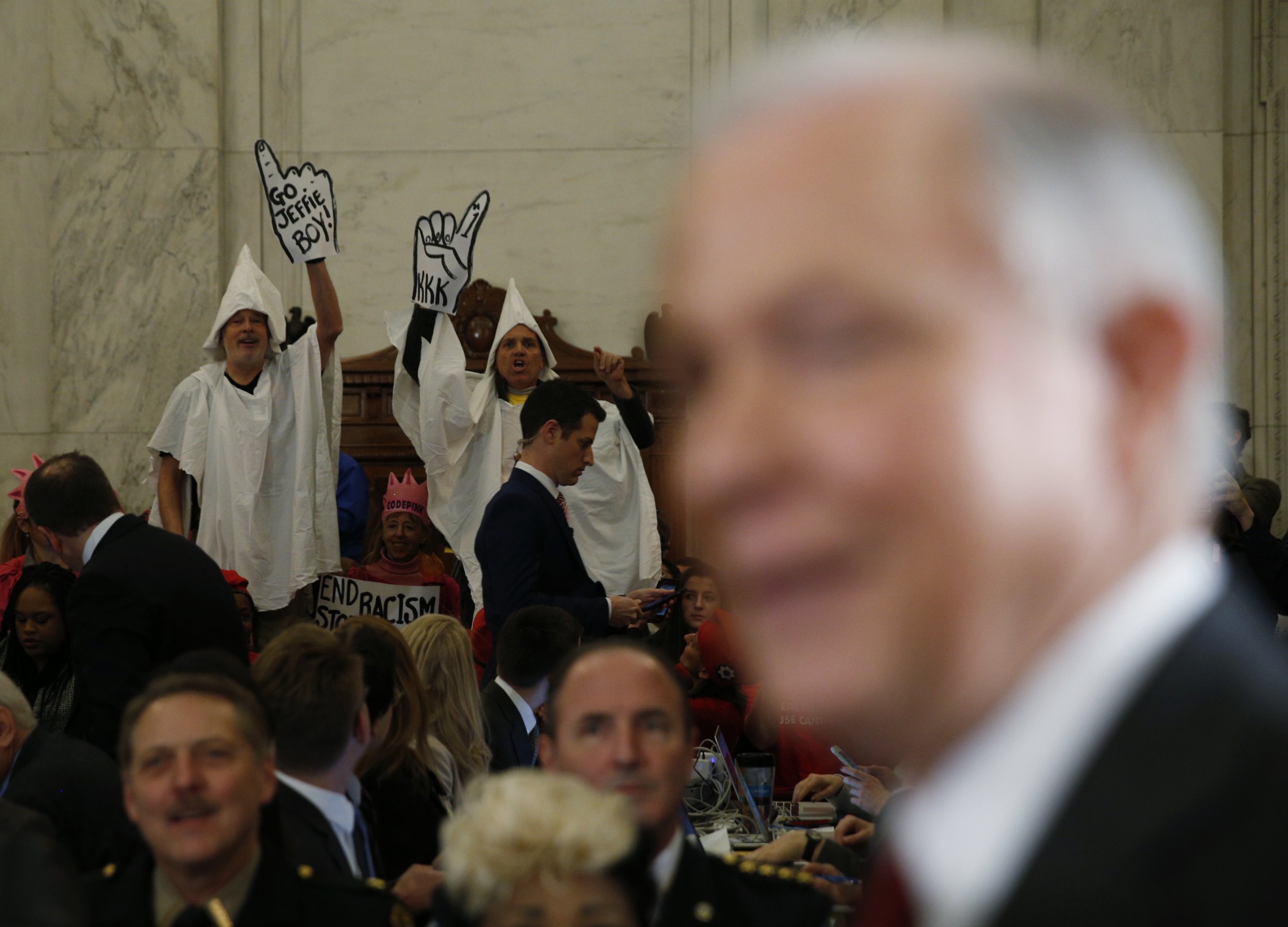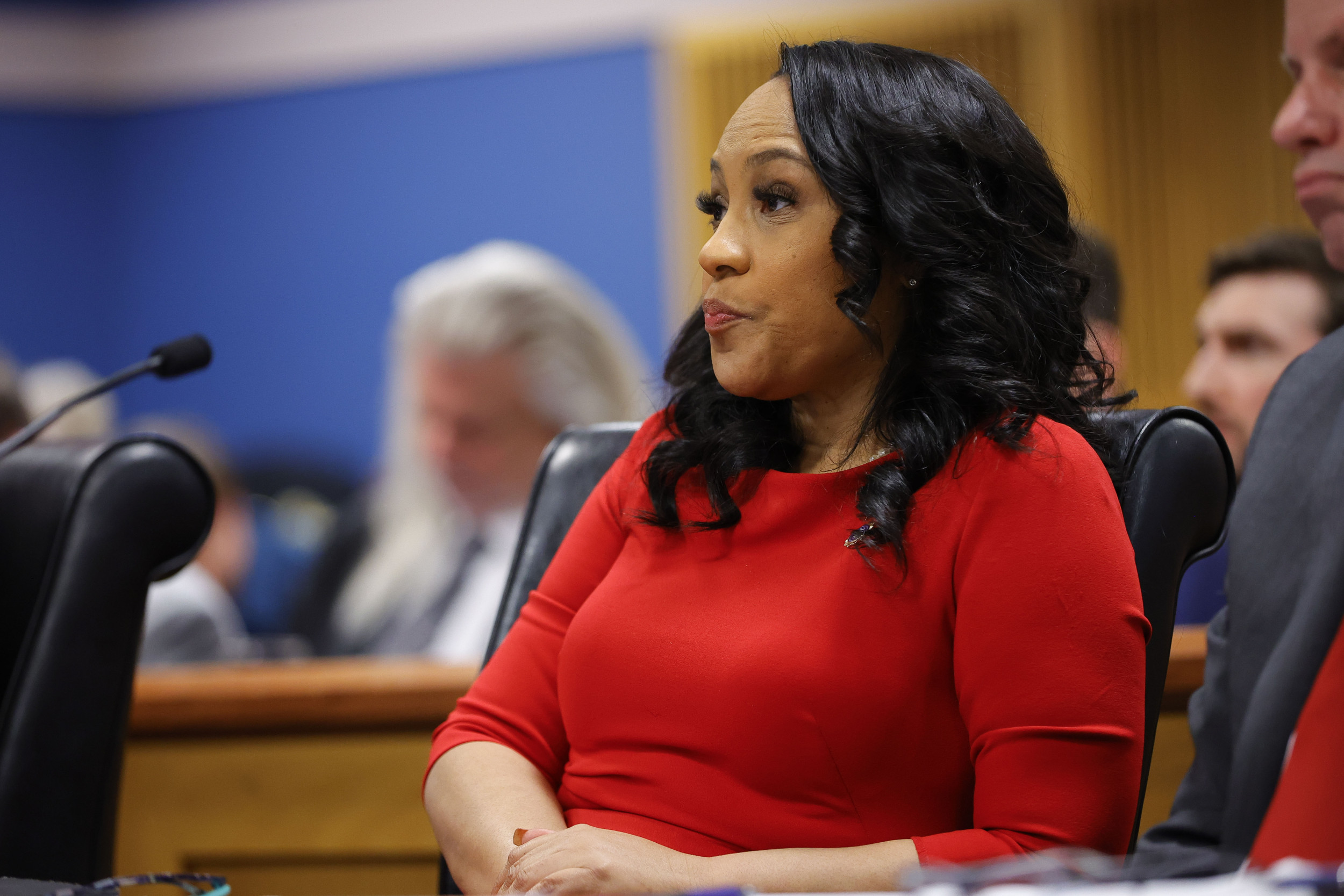
President Donald Trump's campaign and election has inspired a flurry of unofficial violence and targeted state laws reminiscent of the early Jim Crow era.
In September, attacks against Muslims reached their highest point since 9/11. Post-election, the Southern Poverty Law Center claims we have seen more than 1,000 incidents of attacks or harassment. The usually staid New York Times is publishing a This Week in Hate feature, chronicling the new banality of racial violence. School teachers across the country report rising classroom tensions as students' mimic adults' bigotry. Jewish community centers have repeatedly been targeted, with bomb threats across multiple cities. The Anti-Defamation League has repeatedly spoken out against the rising violence. Far from joining in decrying this violence, however, the White House hopes to alter federal policy on Islam. This rising violence parallels Trump's rise, which was fueled by his anti-immigrant, anti-Muslim and anti-Black rhetoric.
Trump's apocalyptic inauguration speech doubled down on the racist dog whistles that fueled his campaign. Framed around the theme of "American carnage," the speech relied on a mythology of endemic urban violence and unsecured borders. But "American carnage" wasn't a description: American carnage is Trump's promise to communities of color. Trump's speech was followed by a vague executive order promising to strengthen policing. Although prediction is always uncertain, the history of the early consolidation of Jim Crow gives us some indication of where the administration is attempting to take us. Trump's coalition is attempting to reload Jim Crow.

Codified Racism
Analysts have drawn parallels to Nazi-era Germany to explain Trump's rise. While these parallels exist, it is important to remember that when it came to race, the Nazis were often borrowing from racial policies the United States pioneered. The Nazi regime adapted anti-miscegenation ordinances, blood purity laws and even concentration camps to the German context. According to Harriet Washington, German tactics led a top American eugenicist to quip, "the Germans are beating us at our own game." We can look for historical corollaries to the present moment at home.
Moves to eradicate constitutional protections, promote police powers in the face of abuses and encourage violence against minorities are not historical anomalies. A similar confluence of events helped to consolidate Jim Crow. Once the federal troops left the South after Reconstruction, so-called "Redeemers" crafted Jim Crow policies, an amalgamation of official law and informal social behaviors meant to reinforce unequal race relations. What was initially custom, such as restrictions on where black people could walk in cities, were later codified in law. Black people who refused to defer to whites risked being beaten or even murdered. Under Jim Crow, the apparently random, individual attacks supported the larger edifice of white supremacy. Violence was often explained away as the work of individual deviants and occasionally denounced by political leaders.
It is comforting to think about the current trend of rising violence in isolation. Journalists chronicling the rising reports typically limit their analysis to individual events. This narrow focus is important, as it allows us to understand the particularities of a given case. But rising racial violence should be contextualized in the broader history of U.S. race relations. Typically, attacks against people of color are not simply the work of disgruntled racist individuals: attacks are an attempt to normalize racial inequality through everyday violence. Violence is a form of racial discipline. Rising racial violence—and the Trump administration's apparent willingness to either turn a blind eye or to support informal attacks with formal law—are strikingly like the social conventions and the state legal apparatus under Jim Crow.
The confirmation of Alabama Senator Jefferson Beauregard Sessions to head the Justice Department is a step toward using state power to countenance the unofficial racial violence Trump supported throughout the campaign. Sessions has been hostile to legal protections for people of color throughout his career. He considers the Voting Rights Act "intrusive." Early in his career he prosecuted civil rights activists for "voter fraud." Sessions' positions were once considered so repugnant that when President Reagan nominated Sessions for a federal judgeship, the Senate refused confirmation. No less a figure than Coretta Scott King wrote a letter saying that if Sessions was confirmed to the bench, he would use the position to forward racist policies that prior generations accomplished "with clubs and cattle prods." Attorney General Sessions is already using the law as a cudgel to beat minority voting rights, as the justice department has reversed position on an important Texas voter ID case. Sessions has also advocated for less oversight for police departments, such as those in Chicago and Baltimore, where the Justice Department found officers calling for "race war" on social media or using arrest templates with "black male" already filled in. And Sessions supports reigniting the drug war, which many scholars see as a primary cause of the mass incarceration of people of color.
It is, of course, impossible to know if Trump is intentionally, or incidentally, fostering an environment reminiscent of early Jim Crow. Yet, his public statements and policy preferences follow a clear pattern. Trump's tepid disavowal of former Ku Klux Klan leader David Duke, Trump's encouraging supporters to "knock the crap " out of protesters and promising (then refusing) to cover bail not only push the boundaries of acceptable political speech, they implicitly support violence. Beyond rhetoric, Trump's policy preferences also create an environment of state terror for people of color. Evidence shows a Muslim ban would do little to stop terrorism just as ICE raids do little to stop immigration. But, these policies do create a sense of powerlessness and terrorize their targets, potentially minimizing political opposition. Although the administration would likely deny any explicit racial intent it is not a stretch to infer its presence.
Racial Violence
During Jim Crow, and now, violence was used to suppress political participation. In both eras, uncertainty about when violence would erupt supports the myth that violence is a rare event. Plausible deniability is built into the system, allowing leaders to distance themselves from the racial attacks their policies encourage. Trump has adopted this tactic, claiming he doesn't understand why his followers resort to violence. Meanwhile, his administration is pursuing a legal strategy that will make it more difficult for people of color to receive even a modicum of justice. These occasional denunciations only serve to take attention away from the consolidation of state violence through restricting voting rights, increasing deportations and targeted ICE raids.
Trump supporters' racial violence is not a historical anomaly. Open racial violence with the tacit support of the state is more historically common than the relative freedoms of the post-Civil Rights era. Experts on the consolidation of Jim Crow describe the development of a legal system based upon social conventions of racial subordination. These conventions included a racial etiquette that normalized racial deference rituals. Whites wielded a spectrum of savagery—from beatings, to pogroms, race riots and the noose—against blacks who resisted the racial etiquette. This denial of basic dignities was written into the law and reinforced through daily practice. Whiteness was deputized and became an extension of the state's monopoly on violence. Jim Crow practices were a set of political rituals meant to deny blacks the dignity and the ability to resist.

Part of the genius of the Civil Rights Movement was confronting the daily violence of Jim Crow. Through sit-ins, boycotts, freedom rides and marches—black people exposed the viciousness of Jim Crow. By showing the violence that breaches of the racial etiquette evoked—the burned buses, protesters scalded with coffee, cigarette burns on students who just wanted a hamburger at Woolworth's, and the iconic photos of dogs attacking peaceful protesters—activists undermined the legitimacy of the Jim Crow state. Confronting this violence head-on, black people showed its fundamental illegitimacy—an illegitimacy that Trump's racial policies share.
The civil rights movement also showed there was nothing inevitable about racial subordination. Kids, students, church-people, academics and the poor rejected the indignities of Jim Crow. The thousands of people flooding airports in opposition to the Muslim Ban, the sanctuary movement that aims to protect migrants, and the Women's March on Washington give reasons to remain hopeful as the administration uses America's worst racial history as a policy blueprint. Committed activists building on the Civil Rights tradition are already attempting to stop Trump's American carnage.
Victor Ray is an assistant professor of sociology at the University of Tennessee, Knoxville.
Uncommon Knowledge
Newsweek is committed to challenging conventional wisdom and finding connections in the search for common ground.
Newsweek is committed to challenging conventional wisdom and finding connections in the search for common ground.
About the writer
To read how Newsweek uses AI as a newsroom tool, Click here.





